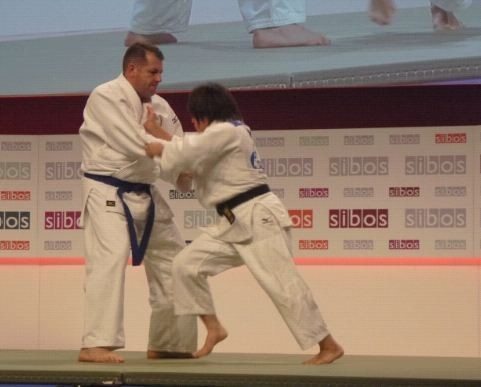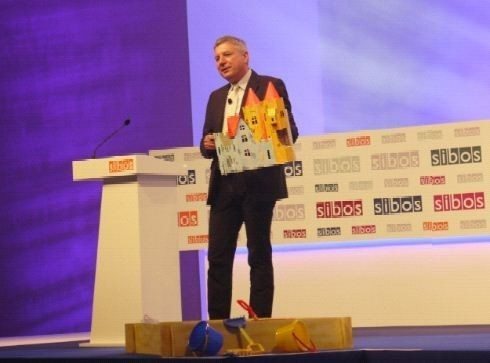
The first main session of the day just finished and was
entitled: “The Tribe on the Tatami”.
Most of us were thinking, what’s all that about?, but being the innotribe opening it’s not surprising.
Tatami is a type of mat used for Judo and sterling member of our financial community Dr. Christopher
Sier, the main director with the Financial Services Network based out of London,
had volunteered to be a knockabout chum with Aiko Sato, the world’s current
ladies judo champion.
Well done Chris.
The theme was actually surprisingly relevant to the show, as
it’s all about how lean and mean small upstarts (Aiko) can take on old and fat
heavyweight industries like banking (Christopher) … lol … and yes, Christopher got a right old
hammering.

However, if you prefer a more formal write up, the theme of
the innovation stream is based upon a similarity of how to innovate that was
created by Kanō Jigorō over a century ago.
Kanō was often defeated in the normal marital arts of karate
and jujitsu, because he was small and light and his opposition was often bigger
and heavier.
He felt there had ot be another form of fight, and observed
the mainstream martial arts to find another way.
This other way he called Judo, the gentle way.
Judo was based upon four principles: maximise efficiency
with minimum effort; train safe; sudden death; and learn from competing.
These four principles can be applied to all forms of
innovation as well.
Maximise efficiency with minimum effort means to take away
the friction in doing business. A great
example was then provided by Mark Pesce, founder of futurestreet.
He talked about how coconut pickers in India used to struggle
to sell their coconuts.
I wondered where this was going, but Mark made a hugely impactful
point about how these coconut pickers have gradually been automated by mobile
connectivity.
What the mobile has done is enabled all the coconut pickers
to receive a text alert each morning from the coconut companies that buy coconuts
with their pricing for the day.
Equally, all the drivers who can pickup and dropoff coconuts
are connected by text messaging.
In other words, the coconut marketplace has become an
automated trading market and what was previously impossible to imagine – on
demand coconuts through coconuts-as-a-service – has meant that a market has
been disaggregated to create maximum efficiency through minimal effort.
Brilliant, and it could be a similar upheaval in banking in
the future if innovation has anything to say about it.
In terms of training safely Kosta Peric, the leader of the
innotribe, made the point that companies need to innovate safely.
You do not want ot destroy your core business or damage your
brand by failing and doing silly developments that impact customers in a potentially
negative way. Therefore you need some
way of creating innovation safely.
He equated this to a castle and a sandbox – coincidently the
title of his new book!

Kosta has the view that the castle is the core business and must be kept safe but,
like parents put children in a sandbox to safely play without destroying the
home castle, the industry can do the same.
He called the innotribe the industry’s sandbox, and
encouraged all banks to come and try out new ideas through the innotribe.
A great contextual way to put such ideas.
The next principle is sudden death which, in Judo, means
over-coming your opponent with death move through a throw, armlock, strangle
hold or a holddown (Dr. Sier was really enjoying this bit, cough).

In banking, William Saito of InTecur felt that this is
embodied in the spirit of innovation through being entrepreneurial. Entrepreneurs
are willing to fail, but they learn from failure, adapt and try again. That is why entrepreneurs are able to take
ideas into action, and that is the key to innovation. Try, fail, learn, adapt and try again.
Continually adapt, learn and evolve and don’t worry about
failing so much. “In fact, the opposite
of success is not failure”, William added, “but not doing anything”.
Wise words.
Finally, competition is good because you learn fast when you
are competing.
This was illustrated by Sean Park of Anthemis, who talked
about the differences between the industrial age and the information age.
In the industrial age, everything was based around capital,
products and scale, but the information age is all about the customer,
distribution and resilience.
In the olden days it cost a lot to do anything, everything
was centralised and information was scarce.
Today, information is abundant, it costs virtually nothing
to do something new and everything is out there.
I obviously endorse that sentiment as most of my business
runs for nothing (this blog is free!), so take note.
All of these principles and presentations were meant to
shake up the banking audience into action and, as they left the room, I could
see many of the attendees taking action.
GIMME COFFEEEEEEEEEE!!!!!!
Yep, wake up and smell the coffee folks and, on that note, I
think I’ll join the queue.

Chris M Skinner
Chris Skinner is best known as an independent commentator on the financial markets through his blog, TheFinanser.com, as author of the bestselling book Digital Bank, and Chair of the European networking forum the Financial Services Club. He has been voted one of the most influential people in banking by The Financial Brand (as well as one of the best blogs), a FinTech Titan (Next Bank), one of the Fintech Leaders you need to follow (City AM, Deluxe and Jax Finance), as well as one of the Top 40 most influential people in financial technology by the Wall Street Journal's Financial News. To learn more click here...

